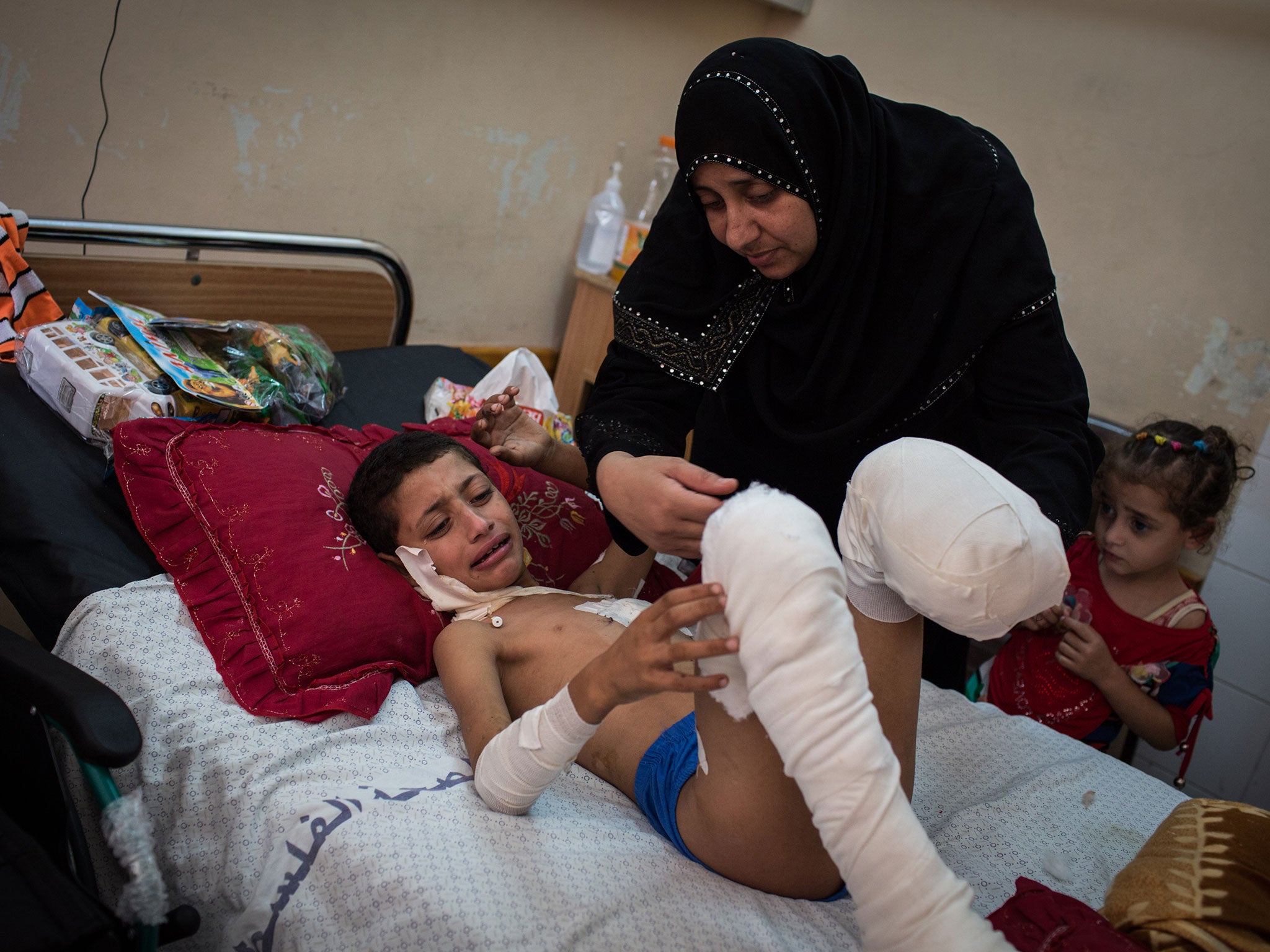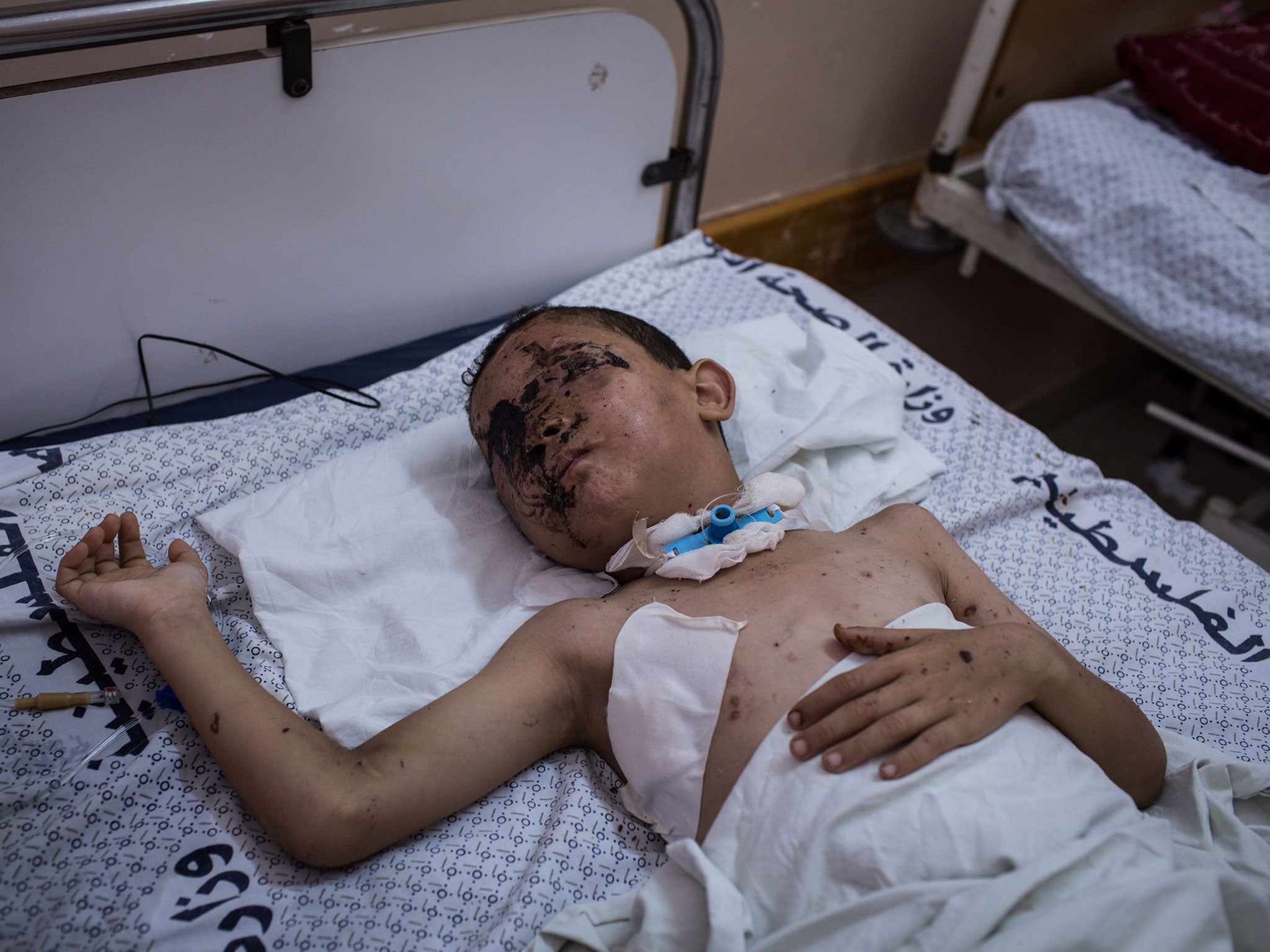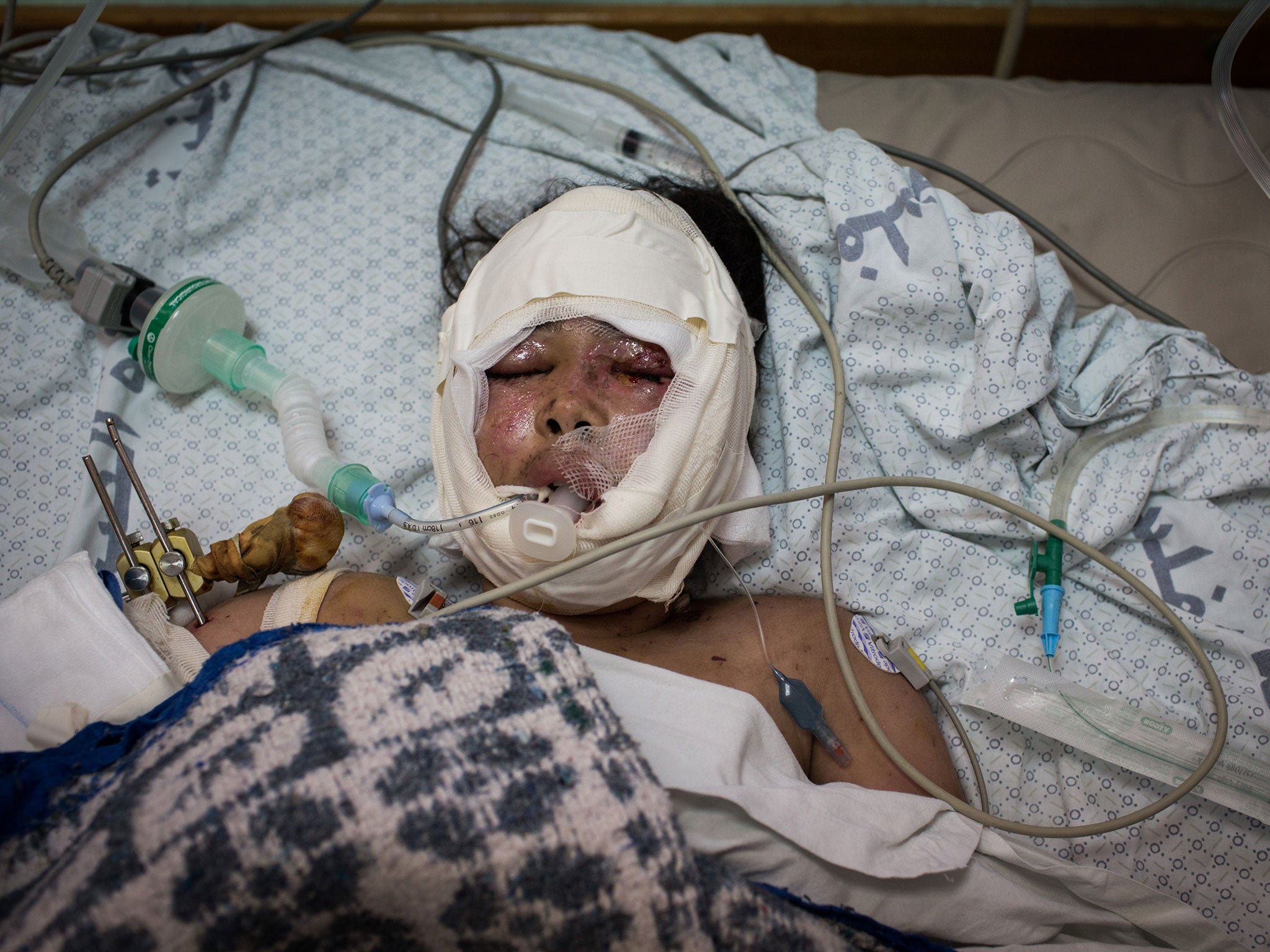Gaza conflict: As Israel and Hamas both claim victory, hundreds of children suffer life-changing injuries

Ibrahim Khattab, nine, unwrapped a yellow plastic toy bus at Shifa Hospital yesterday, while his mother sadly recalled the trivial argument he had with his older brother before they were splattered with shrapnel from an Israeli missile.
As the brother, Wassim 15, lay in the bed beside him, also seriously injured, their mother Khetam, 39, described how last Friday she told the two boys that the breakfast would be ready in a few minutes.
“Ibrahim wanted to go out to play but Wassim was hungry and said he wanted to stay until breakfast was ready. But Ibrahim persuaded him. I wish now he had listened to his older brother and they had stayed for breakfast,” she said.
Shortly after they joined their friends in the street outside they were struck by heavy shrapnel from a missile fired by a drone. A week later Wassim was lying in the surgical ward at Shifa, a metal external fixator on his right leg to stabilise the bone and tissue after an open fracture. And Ibrahim had his left leg amputated below the knee.
These are brave boys, flinching and crying out only when their dressings are changed because of the sting of the iodine used to disinfect their wounds. “Please don’t” Ibrahim pleaded with a nurse. “Why do you have to come every day?” suggested the teenage Wassim, who wants a future career in which he can put his passion for computers to good use, and who his mother says is consistently first in his class. “Why can’t you come every other day?”
Shifa Hospital, the biggest hospital in Gaza, is struggling to cope with what Dr Ghassan Abu Sita called the “overwhelming” admissions of child casualties, around 2,000 of whom have been injured during Israel’s Operation Protective Edge. Dr Abu Sitta is Beirut-based Palestinian-Lebanese volunteer reconstructive surgeon who has been brought in to Gaza by Medical Aid for Palestinians, a UK-based charity.

He said that 80 per cent of the children he had seen would be left with at least some “permanent disability of deformity”. Some cases will need up to five surgeries before rehabilitative therapy can begin. Much of it “you need to clean the wounds because of the debris, masonry, sand, and pieces of wood” that become embedded in it.
At the same time the hospital has diminishing quantities of essential supplies and no modern trauma equipment which might relieve some of the pressure on the hospital’s skilled but hugely hard-pressed clinical staff. And while the hospital is seeking to refer the most serious cases to hospitals in Jordan, Egypt, and the West Bank, it faces long and bureaucratic delays due to border closures on the part of both Israel and Egypt.
Hanin, nine, and Yasmine al Bakri, 11, were helping their mother bake bread on Monday in an oven on the balcony of their three-storey home in the crowded Beach refugee camp, when it was hit by explosions - apparently from two F16 bombs - killing their mother Ibtisan, 38, and two of their sisters, Amaa, four months, and Asil, seven. Both sisters were badly injured and are currently in Shifa’s burns unit, but Hanin has a severe open fracture to an upper arm.
Dr Abu Sitta conducted surgery to tunnel muscle from her back through her armpit to the upper arm, but he warned that she would have a permanent disability: not having the use of her elbow. As her sister was in the operating theatre, Yasmine said she was feeling pain in her arms and legs. "I was helping my mother,” she said. “I can’t remember anything after that.”
At her bedside, her grieving widowed father, Mohammed, who works as a cleaner and who was also burned and injured in the attack, said stoically of his bereavement: “It is God’s will.”
Every now and then, Fares Awda breaks into a wonderfully infectious grin, despite a trauma requiring multiple surgery. On the last day of Ramadan, 27 July, Fares, 11, was excited to be going out with his father and uncle from their home in the Zeitoun dstrict of Gaza City. “We were me and my father and my uncle. We were going to buy things for the Iftar [the Ramadan evening meal] and the Eid [the next day’s festival] and for me to have a haircut. I heard shooting and then there was a drone rocket. I couldn’t feel my leg. But then I saw a lot of blood.”
He remembers his father Jamil, 31, an employee of the Ramallah-based Palestinian Authority, who was also injured but who is entirely focused on his son, shouting for someone to call an ambulance. “He was hugging me and then we went into a house.”
At this point, his father lost consciousness. The ambulance came in about 30 minutes. Fares is keen on his PlayStation, but also on football - he’s a Barcelona supporter. But Dr Abu Sitta says his left leg currently faces two dangers - “non-union” of the bone and osteomyelitis caused by “a very dirty wound” due to debris. His left leg, currently in a plaster cast, should have a metal external fixator to stabilise the bone and surrounding tissue but they are in short supply in Shifa.
Fares says: “I want to get out of Gaza so I can get better treatment in a better place and be able to walk again.”

Shaad Al Bayeuma, nine, has been in a coma in the intensive care unit since she was admitted after a F16 bomb landed on the house she was living in with her family - and three related ones - in the Nusseirat refugee camp. The bomb killed 12 people, including three of her sisters. Dr Hassan Khalef, Shifa’s medical director, who happens to be Shaad's great uncle, said that she had brain contusion, and had had surgery to repair her punctured diaphragm and clear blood and air from her damaged lung. He added: “We don’t know how much hypozxia has caused damage to her brain, or what the effect on her brain will be.”
When Mohammed Badran, eight, who was blinded and had his face badly disfigured by the blast from the bomb that fell on his house, also in Nusseirat, first arrived, doctors thought his family had been wiped out. In fact his mother Tagorid, 40, has been continuously at his bedside comforting him and helping nurses to clear his breathing, obstructed by the mucus which builds up in the tube from his trachea. Mohammed, initially uncomprehending that he had been blinded, asked nurses: “Why have you switched the lights out?”
But while Mohammed’s case is one of the most highly publicised in Shifa, his mother and uncle are desperate to see him moved to a hospital in Europe, where Dr Abu Sitta says that the complex surgery patients like him require is more available.
“He needs microsurgery just to get a prosthetic eye socket,” he said. At one point, Mohammed, unseeing, simply held out his arms, seeking nothing more than a hug, which his mother, immediately bending down, gave him, enfolding him in her arms and clutching him to her cheek.